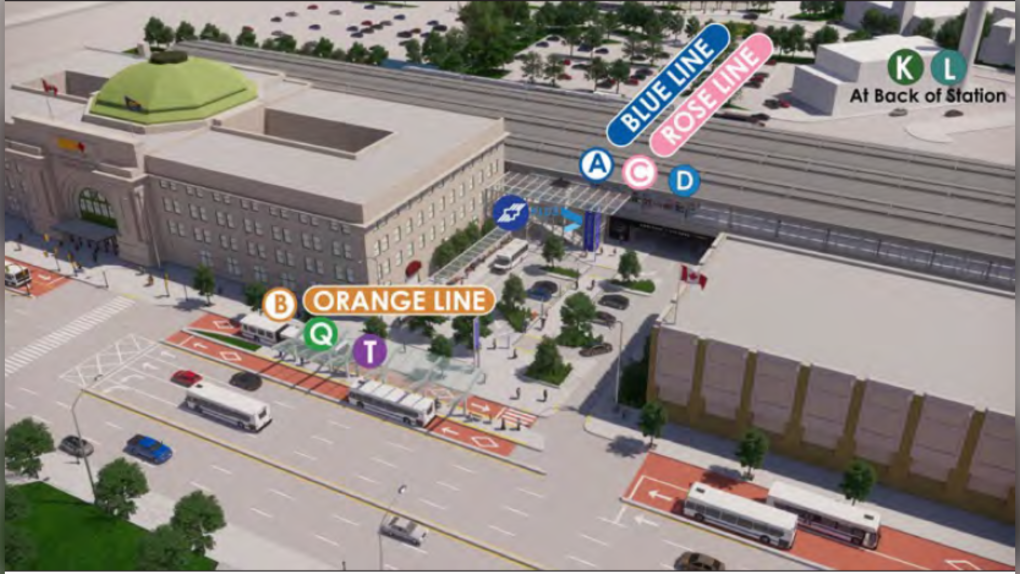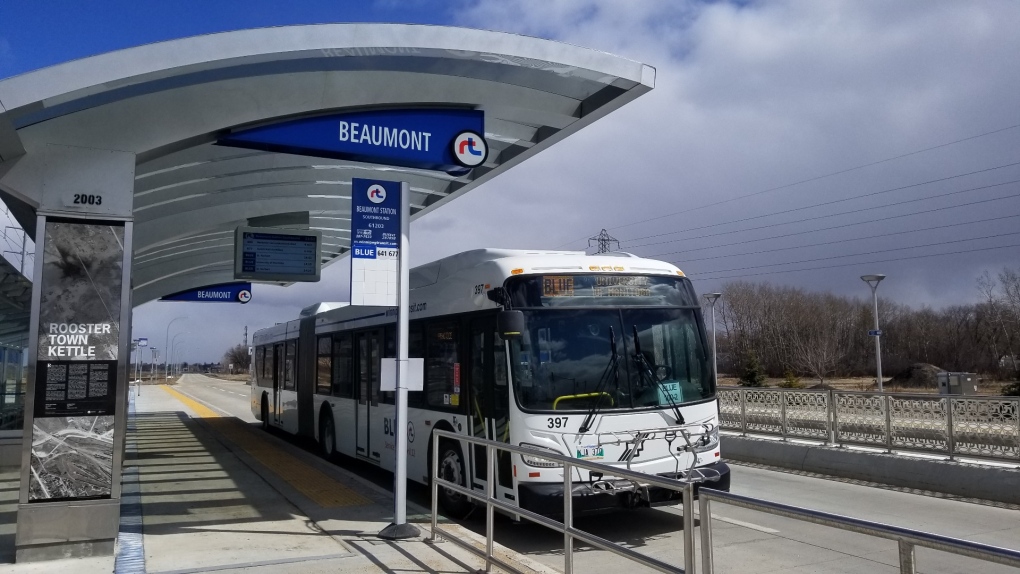'Decades behind other cities': Winnipeg's Transit Master Plan proceeding slowly
 Winnipeg Transit has begun planning and design work for three new rapid transit stations and a connecting downtown corridor, which are the next infrastructure projects slated to be built. (Source: Master Transit Plan)
Winnipeg Transit has begun planning and design work for three new rapid transit stations and a connecting downtown corridor, which are the next infrastructure projects slated to be built. (Source: Master Transit Plan)
The City of Winnipeg's long-term transit plan promising more frequent and dependable public transit service, rapid transit to all parts of the city, and a complete reorganization of bus routes is not moving forward as quickly as it could be.
The Winnipeg Transit Master Plan (WTMP) was approved by city council in the spring of 2021 after years of planning and public consultation. It presents an organized vision for the future of Winnipeg's transit system and describes in detail the steps needed to get there.
Not a lot has happened publicly since the plan was approved, though Winnipeg Transit senior transit planner Kevin Sturgeon says there's still planning work going on in the background.
"We've been looking at our infrastructure plan, we've been looking at our service plan," said Sturgeon. "We have about 1,000 bus operators and we need to create the network in enough detail that we can divide it up into 1,000 shifts for each season."
ROUTES REORGANIZED
The WTMP short-term network plan over the first five years calls for a complete overhaul of all bus routes in the city into a more efficient system categorized into three route types. Rapid line routes through major traffic arteries would run every five to ten minutes, frequent line service routes along busy roads would come through every 10 to 15 minutes, and direct lines serviced by feeder routes would have a 10-20 minute frequency rate.
"Most routes that people have known for many years will disappear and be replaced by something else," said Sturgeon.
Winnipeg Transit will also expand its "On Request" program to specific neighbourhoods after a successful pilot run. The service allows riders to call a bus to the nearest stop on-demand using the Winnipeg Transit app.
Sturgeon says the route reorganization should be complete by 2025. "The primary transit network of spine routes on major streets throughout the city, and then feeder routes that connect to that will be in place in just a couple of years," he said.
Sturgeon added the route revamp should improve Winnipeg's bus service overall. "We'll have a lot more high-frequency routes than we do now, we won't have any branched routes," he said. "Those are some of the things that cause our unreliability and lateness, and the inability to deal with the lateness in the system we have today."
Sturgeon said Winnipeg Transit is hoping to begin the next phase of the city's rapid transit expansion in 2025 as well, subject to budget approval.
The long-term WTMP describes an expanded rapid transit network stretching to all four corners of the city. A new BLUE line would run east/west down Portage Avenue, a proposed ORANGE line would service north/south Main Street to downtown, and an eventual ROSE line would run down Regent Avenue to Transcona.
They would join the current BLUE bus rapid transit line, which began carrying passengers north/south from downtown Winnipeg to St. Norbert in 2020.
 Three new rapid transit routes would join the current BLUE bus rapid transit line, which began carrying passengers north/south from downtown Winnipeg to St. Norbert in 2020. (Source: Daniel Timmerman/CTV News Winnipeg)
Three new rapid transit routes would join the current BLUE bus rapid transit line, which began carrying passengers north/south from downtown Winnipeg to St. Norbert in 2020. (Source: Daniel Timmerman/CTV News Winnipeg)
BENEFITS OF TRANSIT FOR THE CITY
A well-executed transit system can bring great benefits to a city at large. James Bartholomeusz is an urban transport manager with the International Transport Workers' Federation (ITF), which advocates on behalf of transport unions around the world.
"There's a very compelling case for public transport investment because it ticks every box," said Bartholomeusz. "Economically, socially, environmentally, public transport is a good thing for society in general."
Bartholomeusz said an improved public transit system reduces stress on transit workers and cuts down on the amount of abuse they face. He said public transit also has obvious environmental benefits and points to a recent ITF study which found public transit is good for the economy.
"What we found in that research is huge job creation potential from public transport investment," he said.
Some work has begun on the WTMP. Upon approval of the plan in 2021, Winnipeg Transit applied for and received federal funding under the Investing in Canada Infrastructure Program. More than $500,000 has been allocated towards WTMP projects, primarily for the purchase of a zero-emission electric bus fleet and a new north transit garage to service them.
Winnipeg Transit has also begun planning and design work for three new rapid transit stations and a connecting downtown corridor, which are the next infrastructure projects slated to be built.
Sturgeon said Winnipeg Transit will have more WTMP details to announce next year, but a lot of what is detailed in the plan is on hold for now.
"There's no timeline for rapid transit expansion, there's no approved construction funding or anything like that," said Sturgeon.
PLAN MOVING SLOWLY THROUGH CITY HALL
St. Vital councillor Brian Mayes acknowledges the WTMP is proceeding slowly. "Obviously, we'd all like it to move more quickly," he said.
Mayes likes a lot of what's in the plan. "Trying to get going on some parts of the master transit plan, I'd like to see that," he said. "But I do think we need to have a more accurate costing than what we were given."
Mayes would like to take another look at the plan's financial figures, as it's been a few years since city council last discussed the plan.
"There's great fear the garage will cost a lot more than was originally projected," said Mayes. "If this garage costs 400 million, not 200 million, are we on the hook for the overrides?"
Mayes also thinks there are aspects of the WTMP that should be communicated more clearly to Winnipeggers, in particular the revamp of the route system.
"We approved a plan that would change every single route in the city, so that instead of the (16) Osborne snaking around as it has since the sixties; now everything's going to be much more vertical…much quicker, more frequent, but more transferring," said Mayes. "We've never really walked the public through that."
He feels the new route information should be rolled out in the next year or two, and council could re-examine the WTMP and its associated costs at that time.
"We are without a doubt decades behind other cities on big transit infrastructure," Mayes said.
Bartholomeusz believes the key to a good transit system is a sustainable funding model. The ITF recently published a manifesto on public transit funding that recommends diversified transit funding sources and a reduction on the dependence on fuel taxes, which traditionally fund transit systems around the world.
"(It) lays out certain principles we think reflect sustainable funding in any public transport system," said Bartholomeusz, adding the document was based on the experiences of public transport unions and community groups in several different countries around the world.
Mayes doesn’t think the WTMP will move along any faster until someone at City Hall takes the lead on it.
"We need some sort of plan that we actually start funding and implementing," he said. "Otherwise, it's going to be this piecemeal approach."
CTVNews.ca Top Stories

Trudeau's 2024: Did the PM become less popular this year?
Justin Trudeau’s numbers have been relatively steady this calendar year, but they've also been at their worst, according to tracking data from CTV News pollster Nik Nanos.
Back on air: John Vennavally-Rao on reclaiming his career while living with cancer
'In February, there was a time when I thought my career as a TV reporter was over,' CTV News reporter and anchor John Vennavally-Rao writes.
Death toll in attack on Christmas market in Germany rises to 5 and more than 200 injured
Germans on Saturday mourned both the victims and their shaken sense of security after a Saudi doctor intentionally drove into a Christmas market teeming with holiday shoppers, killing at least five people, including a small child, and wounding at least 200 others.
Overheated immigration system needed 'discipline' infusion: minister
An 'overheated' immigration system that admitted record numbers of newcomers to the country has harmed Canada's decades-old consensus on the benefits of immigration, Immigration Minister Marc Miller said, as he reflected on the changes in his department in a year-end interview.
Summer McIntosh makes guest appearance in 'The Nutcracker'
Summer McIntosh made a splash during her guest appearance in The National Ballet of Canada’s production of 'The Nutcracker.'
The winter solstice is here, the Northern Hemisphere's darkest day
The winter solstice is Saturday, bringing the shortest day and longest night of the year to the Northern Hemisphere — ideal conditions for holiday lights and warm blankets.
It's eggnog season. The boozy beverage dates back to medieval England but remains a holiday hit
At Scoma's Restaurant in San Francisco, this holiday season 's batch of eggnog began 11 months ago.
Warrants issued for 'violent offenders' after Nanaimo jewelry store robbery
Authorities are asking for the public 's help finding two suspects wanted in connection with a Nanaimo, B.C., jewelry store robbery earlier this year.
Wild boar hybrid identified near Fort Macleod, Alta.
Acting on information, an investigation by the Municipal District of Willow Creek's Agricultural Services Board (ASB) found a small population of wild boar hybrids being farmed near Fort Macleod.

































